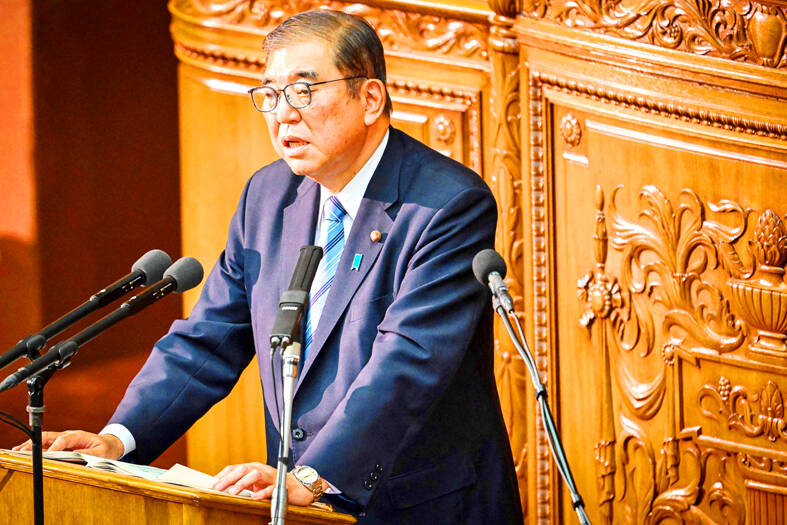Japanese Prime Minister Shigeru Ishiba yesterday said that he would have “frank discussions” with US president-elect Donald Trump, saying that cooperation between them was vital to ensuring a “free and open Pacific.”
“I will have frank discussions with incoming president Trump and lead the alliance to new heights,” Ishiba said in parliament in a key policy address. “Naturally, the US has its own national interest and Japan has its own national interest. That is why I think exchanging opinions frankly and enhancing the national interests of both countries in a synergetic way will help realize a free and open Indo-Pacific.”
Beijing has displayed increasingly assertive behavior in territorial disputes in the Asia-Pacific region, including around Taiwan.

Photo: AFP
Tokyo is also alarmed by nuclear-armed North Korea’s expansion of its missile activities. Trump met North Korean leader Kim Jong-un during his first term.
Ishiba, a self-confessed defense “geek,” has called for the creation of an Asian NATO with its principle of an attack on one being an attack on all.
“The Japan-US security alliance is the foundation of Japan’s diplomacy and security,” Ishiba said. “At the same time, however, the United States receives great strategic benefits from the existence of facilities and areas [controlled by] US forces in Japan.”
In Trump’s first term, then-Japanese prime minister Shinzo Abe appeared to have warm personal relations with the US president, playing golf together several times.
Ishiba and the US president-elect had what the Japanese prime minister called a “very friendly” telephone conversation after Trump’s election win earlier this month.
Key allies Japan and the US are each other’s top foreign investors, and 54,000 US military personnel are stationed in Japan, mostly in Okinawa, east of Taiwan.
Japan has been shedding its strict pacifist stance, moving to obtain “counterstrike” capabilities.
US President Joe Biden and Ishiba’s predecessor, former Japanese prime minister Fumio Kishida, announced a “new era” in defense in April.
Japan is already in the process of doubling its military spending to the NATO standard of 2 percent of GDP, but Trump’s “America First” approach could mean that in his second term he could provide less cash and press Japan to do more.
Trump also caused panic among some of the biggest US trading partners on Monday when he said he would impose tariffs of 25 percent on Mexican and Canadian imports, and 10 percent on goods from China.
Many Japanese exporters, including automakers Toyota and Honda, have plants in Mexico and in Canada. Both firms’ shares fell sharply this week.
Japanese government officials have declined to comment on Trump’s tariff threats, and Ishiba did not address the issue directly yesterday, but Masakazu Tokura, chairman of Japan’s most influential business organization, Keidanren, on Tuesday said that the impact on Japanese firms could be “enormous.”
Trump could also press Japan to join expanded US efforts to limit exports to China, such as semiconductor equipment and artificial intelligence chips, which could hurt Japanese firms.

The CIA has a message for Chinese government officials worried about their place in Chinese President Xi Jinping’s (習近平) government: Come work with us. The agency released two Mandarin-language videos on social media on Thursday inviting disgruntled officials to contact the CIA. The recruitment videos posted on YouTube and X racked up more than 5 million views combined in their first day. The outreach comes as CIA Director John Ratcliffe has vowed to boost the agency’s use of intelligence from human sources and its focus on China, which has recently targeted US officials with its own espionage operations. The videos are “aimed at

STEADFAST FRIEND: The bills encourage increased Taiwan-US engagement and address China’s distortion of UN Resolution 2758 to isolate Taiwan internationally The Presidential Office yesterday thanked the US House of Representatives for unanimously passing two Taiwan-related bills highlighting its solid support for Taiwan’s democracy and global participation, and for deepening bilateral relations. One of the bills, the Taiwan Assurance Implementation Act, requires the US Department of State to periodically review its guidelines for engagement with Taiwan, and report to the US Congress on the guidelines and plans to lift self-imposed limitations on US-Taiwan engagement. The other bill is the Taiwan International Solidarity Act, which clarifies that UN Resolution 2758 does not address the issue of the representation of Taiwan or its people in

US Indo-Pacific Commander Admiral Samuel Paparo on Friday expressed concern over the rate at which China is diversifying its military exercises, the Financial Times (FT) reported on Saturday. “The rates of change on the depth and breadth of their exercises is the one non-linear effect that I’ve seen in the last year that wakes me up at night or keeps me up at night,” Paparo was quoted by FT as saying while attending the annual Sedona Forum at the McCain Institute in Arizona. Paparo also expressed concern over the speed with which China was expanding its military. While the US

SHIFT: Taiwan’s better-than-expected first-quarter GDP and signs of weakness in the US have driven global capital back to emerging markets, the central bank head said The central bank yesterday blamed market speculation for the steep rise in the local currency, and urged exporters and financial institutions to stay calm and stop panic sell-offs to avoid hurting their own profitability. The nation’s top monetary policymaker said that it would step in, if necessary, to maintain order and stability in the foreign exchange market. The remarks came as the NT dollar yesterday closed up NT$0.919 to NT$30.145 against the US dollar in Taipei trading, after rising as high as NT$29.59 in intraday trading. The local currency has surged 5.85 percent against the greenback over the past two sessions, central